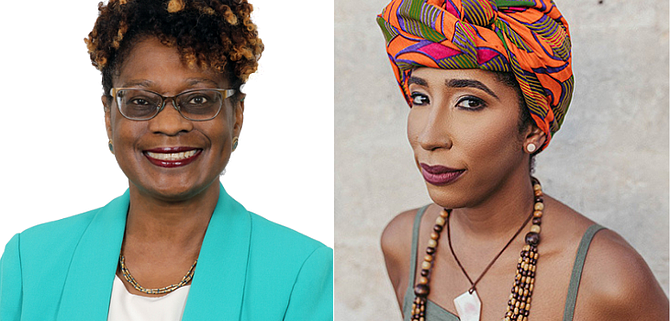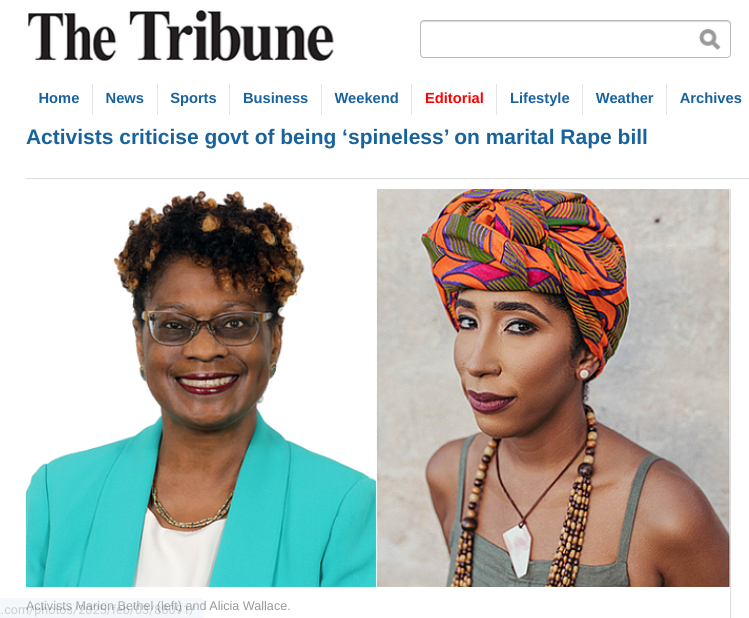Activists criticise gov of being ‘spineless’ on marital Rape bill
February 3, 2025 – The Tribune
Equality Bahamas founder and co-director Alicia Wallace featured in The Tribune on February 3, 2025.
From The Tribune:
By EARYEL BOWLEG
Tribune Staff Reporter
ebowleg@tribunemedia.net
The government’s decision not to move forward with criminalising marital rape this term has drawn sharp criticism from women’s rights activists, who see it as a betrayal of commitments to fighting gender-based violence.
Attorney General Ryan Pinder revealed last week that the Davis administration does not expect to introduce the legislation before the end of its term. When asked if the decision was motivated by political calculations, he suggested that every government grappling with this issue has faced similar concerns.
The announcement comes after former Prime Minister Hubert Ingraham publicly expressed confidence in 2022 that the Davis administration would criminalise marital rape. It also follows statements from Pia Glover-Rolle, Minister of State for the Public Service, who insisted the government sees the issue as urgent and acknowledged the commitment of female parliamentarians to the cause. Other women parliamentarians, including Education Minister Glenys Hanna Martin, have expressed strong support for criminalising marital rape.
The Davis administration released a draft of the Sexual Offences (Amendment) Bill in September 2022, proposing to redefine rape to include acts within marriage. However, progress on the legislation waned despite repeated calls from activists and international human rights bodies.
Former Minister of Social Services, the late Obie Wilchcombe, who was responsible for the Department of Gender and Family Affairs at the time, previously said the government hoped to complete consultations on the bill before early 2023. He emphasised that The Bahamas had to be mindful of its international human rights commitments.
Attorney and women’s rights advocate Marion Bethel said on Friday that she was incensed by Mr Pinder’s comment that the government will not act, arguing that it reflects a broader disregard for the safety and rights of women in The Bahamas. She criticised what she sees as the government’s prioritisation of business and commerce over fundamental human rights.
“If the government listens to voters, then they should be listening to women voters,” she said. “The work is for us as women to have a solid, unified front to this issue. We have to work towards that because it’s clear that not every woman in The Bahamas supports it either.”
Alicia Wallace, director of Equality Bahamas, was blunt in her assessment, accusing the government of siding with rapists rather than protecting survivors.
“It is consistently shown to us as women that marriage is actually a terrible idea in this country, because all it does for us is strip us out of access to our rights, in particular, our sexual and reproductive rights and the right to pass on nationality to our children,” she said. “This administration, like every administration before, it is spineless and incompetent and does not deserve anyone’s votes.”
The debate over marital rape has long been contentious in The Bahamas, with religious groups exerting significant influence. In September 2022, the Ministry of Social Services hosted a one-day symposium on the proposed legislation, but the event was dominated by religious leaders who voiced opposition to changing the law, according to Ms Wallace, who described the symposium as an attempt by the government to negotiate women’s rights without including women’s voices.
The Bahamas has faced international scrutiny for failing to criminalise all forms of marital rape, a violation of its obligations under the United Nations’ Convention on the Elimination of All Forms of Discrimination Against Women (CEDAW), which it ratified in 1993.
In 2023, Mr Pinder revealed that criminalising marital rape was the number one human rights issue countries raised with The Bahamas when the United Nations Human Rights Commission reviewed its record that year.


